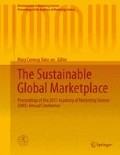Abstract
Co-creation has been emerging as a strategy for value creation, with this exploratory study in the grocery retail context proposing business-to-consumer co-creation as a means of developing solutions to sustainable consumption. The overarching narrative of the research findings is that the market may not yet be ready. Co-creation represents a new paradigm that would require a new orientation in the business-to-consumer relationship to become one of collaboration in the service experience.
Access this chapter
Tax calculation will be finalised at checkout
Purchases are for personal use only
Preview
Unable to display preview. Download preview PDF.
REFERENCES
Alcalay, R. & Bell, R.A. (2000). Promoting nutrition and physical activity through social marketing: Current practices and recommendations. Retrieved October 25, 2010 from http://socialmarketingnutrition.ucdavis.edu/Downloads/ALCALAYBELL.PDF
Arvidsson, A. (2005). Brands: A critical perspective. Journal of Consumer Culture, 5(2), 235–258.
Ballantyne, D. & Varey, R.J. (2006). Creating value-in-use through marketing interaction: the exchange logic of relating, communicating and knowing. Marketing Theory, 6(3), 335–348. doi: 10.1177/1470593106066795
Bolton, R.N. (2006). Foreword in RF. Lusch & S.L. Vargo (Eds.) The service dominant logic of marketing: Dialogue, debate and directions. New York: M.E. Sharpe, ix–xi.
Frow, P., & Payne, A. (2007). Towards the ‘perfect’ customer experience. Journal of Brand Management, 15(2), 89–101. doi: 10.1057/palgrave.bm.2550120
Holbrook, M.B. & Hirschman, E.C. (1982). The experiential aspects of consumption: Consumer fantasies, feelings and fun. Journal of Consumer Research, 9(2), 132–140.
Hollebeek, L.D. & Brodie, R.J. (2009). Wine service marketing, value co-creation and involvement: research issues. International Journal of Wine, 21(4), 339–353. doi: 10.1108/17511060911004914
Jones, P., Clark-Hill, C, Comfort, D. & Hiller, D. (2008). Marketing and sustainability. Journal of Marketing Intelligence and Planning, 26(2), 123–130.
Lovins, A.B., Lovins, L.H. & Hawken, P. (2007). A road map for Natural Capitalism. Harvard Business Review, July-August 2007, 172–183.
Lusch, R.F. & Vargo, S.L. (2006). Service-dominant logic: reactions, reflections and refinements. Marketing Theory, 6(3), 281–288. doi: 10.1177/1470593106066781
Muldoon, A. (2006). Where the green is: Examining the paradox of environmentally conscious consumption. Electronic Green Journal, 23, 1–17. Retrieved June 12, 2010 from http://escholarship.org/uc/item/00/326gx
Peattie, K. (2001). Towards sustainability: The third age of green marketing. The Marketing Review, 2, 129–146.
Pini, F.M. (2009). The role of customers in interactive co-creation practices: The Italian scenario. Knowledge, Technology and Policy, 22, 61–69. doi: 10.1007/s12130-009-9068-x
Prahalad, C.K. & Ramaswamy, V. (2000). Co-opting customer competence. Harvard Business Review, 78(1), 79–81.
Ramaswamy, V. (2009). Leading the transformation to co-creation of value. Journal of Strategy and Leadership, 37(2), 32– 37. doi: 10.1108/108785709109412208
Rowley, J., Kupiec-Teahan, B. & Leeming, E. (2007) Customer community and co-creation: a case study. Marketing Intelligence and Planning, 25(2), 136–146. doi: 10.1108/02634500710737924
South African Advertising Research Foundation (2009) All Media and Products (AMPS) 2009B RA Individual Database, Eighty20 FP. Retrieved July 21, 2010 from: http://www.eighty20.co.za/databases
Sogn-Grundvag, G., Ranes, S.A., Gronhaug, K. & Gray, B. (2009). Co-creating value in a retail market setting. Journal of Food Products Marketing, 15, 1–14. doi: 10.1080/10454440802470532
Vargo, S.L. & Lusch, R.F. (2004) Evolving to a new dominant logic for marketing. Journal of Marketing, 68(1), 1–48.
Yates, L. (2008). Sustainable consumption: the consumer perspective. Consumer Policy Review, 18(4), 96–99.
Zwick, D., Bonsu, S.K., & Darmony, A. (2008). Putting consumers to work: Co-creation and new marketing govern-mentality. Journal of Consumer Culture, 8, 163–196. doi: 10.1177/1469540508090089
Author information
Authors and Affiliations
Editor information
Editors and Affiliations
Rights and permissions
Copyright information
© 2015 Academy of Marketing Science
About this paper
Cite this paper
Chipp, K., Verran, G. (2015). The Application of Value Co-Creation in Advancing Solutions to Sustainable Consumption. In: Dato-on, M. (eds) The Sustainable Global Marketplace. Developments in Marketing Science: Proceedings of the Academy of Marketing Science. Springer, Cham. https://doi.org/10.1007/978-3-319-10873-5_42
Download citation
DOI: https://doi.org/10.1007/978-3-319-10873-5_42
Published:
Publisher Name: Springer, Cham
Print ISBN: 978-3-319-10872-8
Online ISBN: 978-3-319-10873-5
eBook Packages: Business and EconomicsBusiness and Management (R0)

